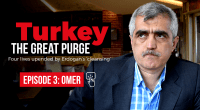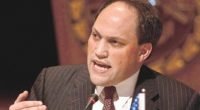Keyword: Democracy

Washington Post on Erdoğan’s purge: Cruel frenzy in march towards authoritarianism
Mr. Erdogan, the Turkish president who was the target of a failed coup last July, has since carried out a wave of arbitrary punishments and imprisonments of thousands of journalists, academics, bureaucrats, lawyers and human rights defenders he suspects of affiliation with Mr. Gulen and his movement. This cruel frenzy is just the latest step in Mr. Erdogan’s march toward authoritarianism.

Fethullah Gulen’s opinion on Turkey today
“As the coup attempt unfolded, I fiercely denounced it and denied any involvement,” wrote Gulen, who has been living in self-exile in the US since 1999. “Furthermore, I said that anyone who participated in the putsch betrayed my ideals. Nevertheless, and without evidence, Erdogan immediately accused me of orchestrating it from 5,000 miles away.

The Turkey I no longer know
The Turkish population already is strongly polarized on the AKP regime. A Turkey under a dictatorial regime, providing haven to violent radicals and pushing its Kurdish citizens into desperation, would be a nightmare for Middle East security. I probably will not live to see Turkey become an exemplary democracy, but I pray that the downward authoritarian drift can be stopped before it is too late.

520 children of imprisoned mothers growing up in jail, yet Turkey celebrates Children’s Day
As Turkey celebrated the 97th anniversary of the foundation of the Turkish Parliament and Children’s Day on April 23, at least 520 children with imprisoned mothers have been deprived of enjoying the day as they are obliged to grow up in jail.

Cold Turkey: Erdogan’s withdrawal from democracy
The bizarre, phantom-like failed coup d’etat staged against Erdoğan’s increasingly brutal regime on July 15 last year saw him seize the opportunity to exterminate, imprison and purge tens of thousands of his enemies, real and imagined, within all strata of civil society, the military, government, media, education, health, the judiciary and other institutions.

Erdogan: Turkey’s man of mystery armed with extra powers
Erdogan’s Islamist supporters sometimes suggest that he is on his way to declaring himself caliph. As the 100th anniversary of the caliphate’s abolition approaches, he may find this tempting; depending on whether he uses the Islamic or Christian calendar, that could happen, respectively, on March 10, 2021 or March 4, 2024. You read it here first.

Turkey, The great purge – Four lives upturned by Erdogan’s ‘cleansing.’ Episode 4 – Betul
Every afternoon from January 23 to March 28, Ms. Celep arrived at the square wearing a white traffic waistcoat emblazoned with the words, “İşimi geri istiyorum” – Turkish for “I want my job back”. Through sunshine and the shivering Istanbul rain, she stood there as supporters — many of whom had also lost their jobs in Turkey’s great purges — arrived to cheer her on, encouraged by the young woman’s sheer guts and charisma.

As Turkey Gears Up to Vote, Its ‘Traitors’ Speak Out
In Turkey, a national trauma has turned into a never-ending nightmare for hundreds of thousands of citizens. Erdogan aimed to root out all Gulen sympathizers and turn them into what one local columnist called “socially dead people.” The government’s crackdown has extended well beyond the Gulenists. Leftist activists, Kurdish politicians, and dissenting academics have all been targeted.

Turkey, The great purge – Four lives upturned by Erdogan’s ‘cleansing.’ Episode 3 – Omer
It was a tweet that set it all off. An innocuous post that plunged Omer Faruk Gergerlioglu into a personal, administrative and political hell — and a private trauma that has publicly exposed a growing rift within Turkey’s Islamists.

Inside Turkey’s Purge
The police officers came to the doctor’s door in Istanbul at 6 a.m. and one of them said, “You are accused of attempting to kill President Erdogan.” The doctor couldn’t help it; he laughed. “Really? I did that?” The police officers smiled, too. “Yes. Also for attempting to destroy Turkey and for being a member of a terrorist organization.”

Foes on the Run as Erdogan Makes Power Personal
Members of the Gulen religious movement insist they are innocent of plotting against President Recep Tayyip Erdogan of Turkey, but he has chased them into the shadows, and they fear for their lives and livelihoods. At the same time, Mr. Erdogan has increasingly made himself the face of Turkey’s state, and now he is seeking more authority to rule.

Expert: I fear that Turkey is headed to a prolonged period of civil conflict if not civil war
He has become a joke, albeit a dangerous one. He has become Muammar Qadhafi. Turkey is dangerously polarized. We know from Turkish political history that such polarization often leads to violence. I fear that Turkey is headed to a prolonged period of civil conflict if not civil war.

Ex-Pentagon advisor says Turkey is heading towards civil conflict, if not civil war
Rubin underlined that Turkey is already dangerously polarized prior to an April 16 referendum on a constitutional package that will grant sweeping powers to Erdoğan and switch the country to an executive presidency. “We know from Turkish political history that such polarization often leads to violence,” he said.



















